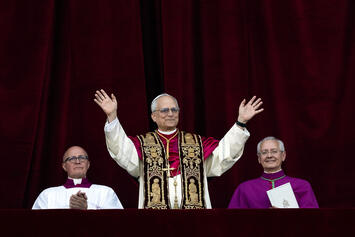
The elevation of the new pope from Chicago may have excited progressive ideologues with hopes for another wokeish papacy. But the rise of little-known Robert Prevost to his new status as Pope Leo XIV comes amid a profoundly unwoke recovery of religious feeling in the West. After generations of decline, Christianity is making a comeback.
To be sure, this revival is still tentative and faces enormous headwinds. The decline of religion remains a fundamental reality in most Western countries, particularly in Europe, where well over 50 per cent of people under the age of 30 do not identify with any religion. In the US, the trajectory has been similar, albeit at a slower pace. In 1965, 70 per cent of respondents to a Gallup poll said religion is ‘very important’ in their lives. Today, fewer than half of Americans – 45 per cent – say religion is ‘very important’.
This decline has led some religious conservatives, like Ross Douthat of the New York Times, to predict a coming ‘age of extinction’ – a world bereft of churches, community and families. Others, like Christian intellectual Rod Dreher, suggest that religious people, like the early Christians, should create their own separate communities – what he calls ‘the Benedict option’ – to cope with an increasingly post-religious world.
Yet the pessimists may be overstating their case. In America, at least, there is evidence of a lingering spiritual hunger: more than half of ‘religiously unaffiliated’ Americans, for example, still believe in God or some kind of universal spirit. Meanwhile, one recent survey shows that young people are increasingly embracing religion, with millennials among the biggest drivers of Christianity’s revival in the US.
There is even evidence of renewal in decidedly secular Europe. France’s Catholic Church claims to have baptised 45 per cent more people this Easter than it did last year. According to the Bible Society, the UK is undergoing a similar conversion. It reports that the number of 18- to 24-year-olds who attend church at least monthly has quadrupled, from four per cent in 2018 to 16 per cent today. The Bible Society said there are two million more people attending church now than there were six years ago.
Religion’s resurgence offers a valuable counterweight to the recent decline in marriage, family, community and civil society – a decline that has been accelerated by technology. Pope Leo, in naming artificial intelligence as humanity’s primary challenge, shows a great insight into these changes. ‘In our own day, the church offers everyone the treasury of its social teaching in response to another industrial revolution and to developments in the field of artificial intelligence that pose new challenges for the defence of human dignity, justice and labour’, he said earlier this month.
At a time when tech elites seem increasingly obsessed with melding humans and machines, Leo’s views matter profoundly. For a growing number of influential people, mortality is viewed as a ‘bug’ to be corrected by technology. This philosophy – ‘transhumanism’ – has gained a number of devotees from Silicon Valley, including the likes of Larry Page, Peter Thiel and Sam Altman. Recently, Mark Zuckerberg has even claimed that the pervasive loneliness of modern society can be addressed by the use of AI-generated avatars assuming the roles of friends and therapists.
But AI, no matter how cleverly developed, cannot replace human contact in the physical world. Indeed, this ‘transhuman’ perspective conflicts with the very human intimacy that is central to religious communities. As the late Jonathan Sacks warned, an algorithm ‘has no space for empathy or fellow feeling’.
The broader rebellion against atheism that we are currently witnessing has been building for some time. The pre-eminence of secularism is now openly opposed by many public intellectuals, such as Jordan Peterson, Douglas Murray and Ayaan Hirsi Ali. More remarkable still has been the revival of ‘natural theology’ among a growing number of scientists, drawing inspiration from breakthroughs in such fields as biology and physics to evoke a less random understanding of the universe.
Read the rest of this piece at: Spiked.
Joel Kotkin is the author of The Coming of Neo-Feudalism: A Warning to the Global Middle Class. He is the Roger Hobbs Presidential Fellow in Urban Futures at Chapman University and and directs the Center for Demographics and Policy there. He is Senior Research Fellow at the Civitas Institute at the University of Texas in Austin. Learn more at joelkotkin.com and follow him on Twitter @joelkotkin.
Photo: Catholic Church England and Wales, via Flickr under CC 2.0 License.












